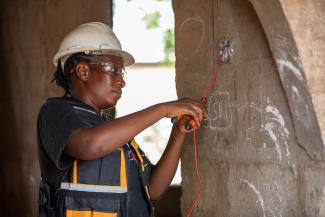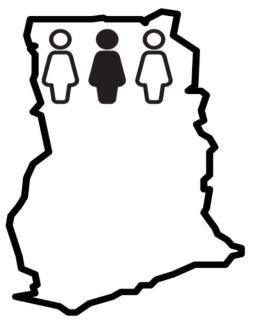
Yooku Ata-Bedu
BACKGROUND
USAID/Ghana works with partners including the government, non-governmental organizations, civil society organizations, and the private sector to address gender-based economic and social barriers, prevent gender-based violence (GBV), and support GBV survivors. Despite continued advocacy for equal rights and safety for all, women, girls, and gender-diverse individuals in Ghana continue to experience discrimination, GBV, economic constraints, unequal access to quality services, and poor representation in leadership positions. This situation is most pronounced in rural and remote areas.
PROGRAMMATIC FOCUS & ACHIEVEMENTS TO DATE
ECONOMIC GROWTH
- Supporting women-owned businesses to access international markets by training them on export processes and identifying 48 gender champions to advocate for cross-border traders.
- Facilitating anti-sexual harassment training for regulatory agencies including the Ghana Revenue Authority, Food and Drugs Authority, Port Authority, Ghana Standards Authority, and the military, reaching 172 staff to date.
- Promoting the participation of women and other marginalized groups in agriculture by training them on best practices to improve productivity and increase incomes, reaching a total of 146,149 participants of whom 48 percent were women.
- Providing gender equality and positive youth development training to 187 outgrower businesses and seven business network associations. Fifty participants have been selected as gender champions to promote gender, youth, and social inclusion within their organizations.
- Reducing the gender disparity in accessing finance by incentivizing financial institutions to lend to women and women-owned enterprises, unlocking over $59 million in loans for more than 37,000 women-owned agribusinesses in the last four years. Women-owned enterprises now make up 62 percent of the agribusinesses that USAID has funded over the last four years.
- Introducing new technologies such as the Ahotor oven, a fish processing stove that produces less smoke, is more fuel efficient and safer for use. In coastal communities, fish processing is predominantly done by women.
- Supporting community-based entities, such as savings groups, to empower women and girls economically, and provide platforms to discuss and address issues like GBV and child labor in the fisheries sector.
- Supporting the Ghana Energy Commission to train and certify wiring professionals by offering short-term certificate scholarship programs to those working in rural, low-income regions in northern Ghana. Forty-four wiring technicians, including 10 women, graduated from the program, representing an 80 percent increase in the number of certified women wiring technicians in Ghana.
EDUCATION
- Training 1,042 communities on gender equity, diversity, and inclusion to support education management and citizen engagement.
- Encouraging women’s participation in school management committees, by working with authorities to ensure meeting times/locations are accessible for all genders and providing transport or childcare as appropriate.
- Offering flexible teacher certification training to accommodate female teachers in remote regions of northern Ghana.
- Providing specialized and affordable financing for women-owned low-fee private schools.
- Training 305 school administrators and teachers to promote gender equality and social inclusion in schools and broadly throughout their work
- Supporting low-fee private schools in northern Ghana to enroll 12,429 girls in grades 1-6.
HEALTH
- Broadcasting gender equity, equality, and women's empowerment messages through mass media and “edutainment” initiatives using popular youth television series.
- Collaborating with the Ghana Health Service to significantly increase women’s representation on Community Health Management Committees from 28 percent to 44 percent in USAID-supported districts. The committees have increased accountability and community-level efforts to address gender-based service delivery gaps.
- Leveraging the support of gender-focused legal entities, including the Ghana Commission for Human Rights and Administrative Justice, the Legal Aid Commission, the Social Welfare Department, and the Domestic Violence and Victims Support Unit of the Ghana Police Service to improve access to GBV support services for survivors in the three HIV-supported regions—Western, Western North and Ahafo. USAID primarily targets the at-risk groups, including adolescent girls and boys, and women who have newly tested positive for HIV.
- Supporting GBV ambassadors to educate community members on GBV/HIV prevention and human rights violations. These GBV ambassadors have reached 30,294 persons through community information centers and an additional 4,443 individuals with HIV testing services.
- Increasing access to sexual and reproductive health knowledge and services, through the public and private sectors, including contraception for vulnerable girls and adolescents to reduce unintended pregnancies, enabling them to have autonomy over their reproductive health.
- Ending child, early, and forced marriage and unions using social and behavior change interventions at the community level by engaging adolescent girls and young women, boys and young men, community health workers, champions, including faith actors and chiefs.
DEMOCRACY, RIGHTS & GOVERNANCE
- Increasing women’s influence and participation in agriculture policy-making and land ownership by sensitizing communities on the importance of inclusivity and training women on farming best practices. Through this, women shea farmers are now able to own land and sustainably supply products for local consumption and export.
- Training women on peace and security in northern Ghana. Over 500 women now play active roles in conflict resolution, peacebuilding, and preventing violent extremism in communities.
- Identifying influential leaders to advocate for the inclusion of women in decision-making at local levels. USAID aims to train 62 women and 8 men to spearhead this process.
- Conducting campaign management training for women, youth, and persons with disabilities (PWDs) candidates of political parties vying for local and national elections to build their capacities on various campaign strategies and effective participation in elections.
OBJECTIVES IN 2024
- Address sexual violence and intimate partner violence through training, sensitization of community leaders, and referral services for survivors.
- Train politically active women, youth, and PWDs on physical and online security, such as mitigating mis/disinformation and bullying/harassment, to ensure safety during the election season.
- Work with community leaders and key stakeholders to promote and utilize positive social and behavioral change for more inclusive decision-making processes.
- Build the capacity of community-based survivor-led organizations and encourage traditional, local, and faith-based leaders to serve as gender champions to advocate for improved health practices among families.

